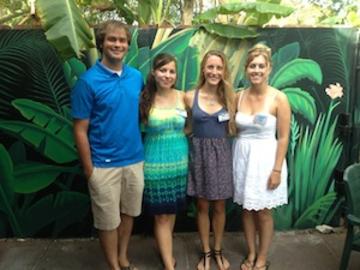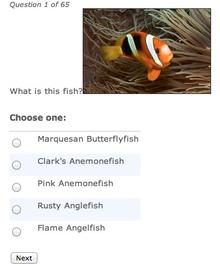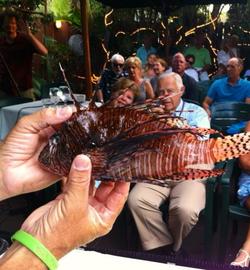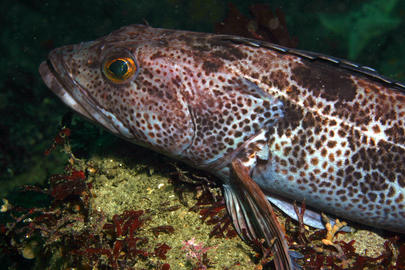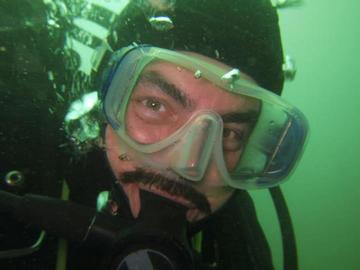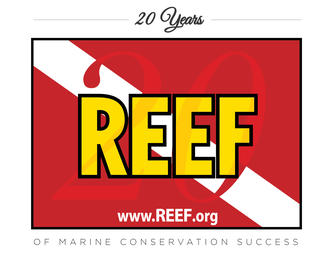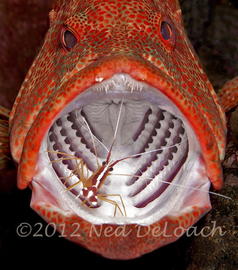Five days remain in our fundraising campaign to raise $10,000 for our REEF Marine Conservation Internship Program, and we are only halfway there! Help us reach our goal by donating today. Please consider supporting these enthusiastic young professionals as they gain critical career skills and provide REEF with invaluable program support. Although less known, the REEF Marine Conservation Internship Program is one of our most successful endeavors.
We recently updated our online quizzes to add several more regions, including the South Pacific, the Northeast, California Invertebrates, and the South Atlantic. If it's been a while since you have visited this resource on our website, check it out today. These fun quizzes are a great way to test your ID skills. You can take the quiz as many times as you want, and questions are randomly generated so it will always be a bit different. Have fun!
More than sixty people gathered earlier this month at the Fish House Encore in Key Largo, Florida, for Lionfish Food and Wine Night. Before dining, event attendees learned about the lionfish invasion and the importance of removing lionfish from marine environments. Peter Tselikis, chef at Fish House Encore, showed the audience how to cook two popular lionfish dishes. Lad Akins, a renowned lionfish expert and REEF Director of Special Projects, taught the audience how to fillet lionfish, avoiding the venomous spines.
Every month, scientists, government agencies, and other groups request raw data from REEF’s Fish Survey Project database. Here is a sampling of who has asked for REEF data recently and what they are using it for:
- A scientists from the Nature Conservancy in Washington is using REEF data to evaluate patterns of biodiversity in the Salish Sea and along the Oregon Coast as part of TNC's ecoregional analysis.
- A student at UNC Chapel Hill is using REEF data from the Galapagos Islands for use in a multimedia class project on data visualization.
REEF members are at the heart of our grassroots marine conservation programs. Over 50,000 divers, snorkelers, students, and armchair naturalists stand behind our mission.
This month we highlight Michael Murphy, a REEF surveyor in the Northeast. Mike joined REEF in 2010 and has conducted 79 surveys, mostly around his home in New Brunswick, Canada. Here's what he had to say about REEF:
When and how did you first volunteer with REEF or become a REEF member?
In the summer of 1993, a group of pioneering volunteers conducted the first REEF fish surveys. Twenty years later, the Volunteer Survey Project and other REEF initiatives are leading the way as innovative and effective marine conservation programs. You are invited to join us this summer to celebrate 20 years of success. REEF Fest will take place August 8-11 in Key Largo, Florida, and will feature four days of diving, learning, and parties.
New Fishinars continue to be added, and upcoming sessions include special sessions all about cleaning stations with Ned and Anna DeLoach, a Sharkinar with Andy Dehart and Marty Snyderman, and Northeast Fishes, plus several new Caribbean fish topics including fish you will see on your safety stop and those you will find in the biodiversity hotspot of Bonaire! Check out the Webinar Training page (www.REEF.org/resources/webinars) for the most up-to-date listing.
This seminal publication was created by REEF and our collaborators at NOAA, ICRI, the United Nations Environment Programme, Caribbean Environment Programme, SPAW-RAC, and the over 40 participants of the 2010 Caribbean Regional Lionfish Workshop. The guide provides best practices for lionfish control and management, including control strategies, outreach and education, research, monitoring, legal considerations, and ideas for securing resources and partnerships.
If you haven't yet booked your space on one of our 2013 REEF Field Surveys, don't delay. They are filling up fast and several are now sold out.

